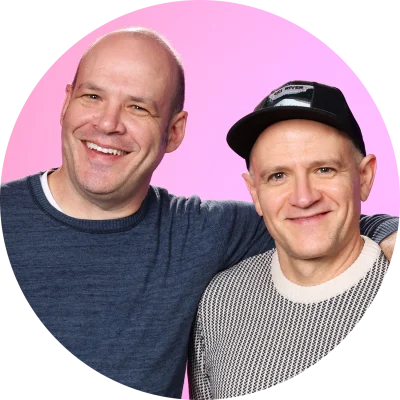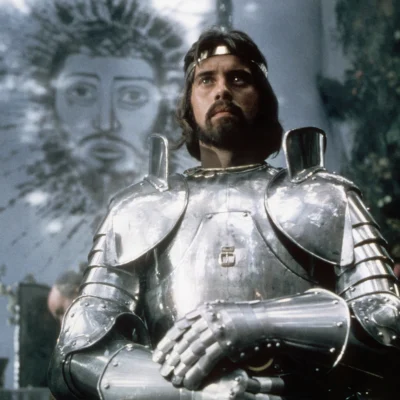
Florian Zeller has spent the better part of the last decade working to bring his plays to the stage, and then, from the stage to the screen. The first in his trilogy of family dramas, 2020's The Father, was adapted from his 2012 play Le Père, which itself earned acclaim when it debuted in England in 2014.
"The Father was difficult to get financed. For two years, it was always just about to happen, so I had a long, long time to prepare," Zeller remembers. "In a way, that was for the best because, when we actually started shooting, even though it was my first film, I was over-prepared. I knew exactly what I wanted to do, and why I wanted to do it. I think that's important, because it's so difficult to make a film. You need to be completely connected to the film and have a deep reason for why you want to make it."
The dedication paid off to the tune of two Oscars in 2021, including Best Adapted Screenplay for Zeller and co-writer Christopher Hampton. In his acceptance speech, Zeller paid special tribute to star and Best Actor winner Anthony Hopkins, saying, "I wrote the script for him. To me, he's the greatest living actor, and just the idea to work with him was like a dream. And I knew that it was not an easy dream to fulfill... But I thought, until someone comes and proves that it was not possible, it means that potentially it is."
Now, nearly two years after that Oscar win, Zeller has returned with his second film, The Son, adapted from his 2018 stage play, Le Fils. Compared to The Father, the road to getting The Son made was considerably shorter, but the filmmaker was no less committed to his reason for wanting to make the movie. "I remember the emotions I shared with the audience whenever The Son was performed," he says. "So many people understand what it's like when you reach a place where you don't know what to do anymore as a parent, and to share those emotions with members of an audience, that was really where my desire to adapt The Son as a film originated."
Following the release of The Son, Zeller says, "I would love to explore different things and jump into the unknown a bit more." He has 11 other plays to adapt to the screen — including The Mother, the third part in this trilogy of plays — should he choose, but, "Right now, I'd probably say that I'll end up starting on something completely new."
Below, Zeller shares with A.frame the five films that have inspired him the most as a filmmaker.

Written and Directed by: David Lynch
To me, Mulholland Drive is one of the greatest films ever made. It's also one of the most beautiful films about the city of Los Angeles and the dreams that it can both create and crush. What I really love about it is how meaning is built in it, and how the film's meaning unfolds in accidental ways — through contradictions, and oppositions, and mirrors. I like the fact that it's an amazing cinematic maze in which the audience must accept being lost. Then, in order to be found, you have to be connected to your own subconscious in order to follow the film's story. That's something, as a viewer, that I find profoundly exciting and rewarding. It's like a puzzle where we know that a piece is missing and we know that it'll stay missing until the very end, but we still try to figure out the meaning in a way that feels poetic and subjective. It's for that reason that I think the film is ultimately a masterpiece.
There is also the manipulative nature of cinema in Mulholland Drive because in, say, the Club Silencio scene, we're overwhelmed by our emotions just moments before Naomi Watts' character realizes that what she's watching is recorded and fake. Cinema is all about illusion, and I think Mulholland Drive is the greatest film about illusion. Of course, Hollywood is also an illusion and succession is an illusion too, but there's something special about how Lynch's film addresses the nature of art as an illusion, and how it allows you to look into yourself and understand new layers of life each time.

Directed by: Krzysztof Kieslowski | Written by: Krzysztof Kieslowski and Krzysztof Piesiewicz
The Double Life of Véronique is a major film in my eyes, because of how it drives you to change your own perspective on life. There's this spiritual dimension to the film. It presents life as something elusive, magical, and mysterious. The film is, in other words, an invitation to try to read what is not visible, and I think it's the most profound and beautiful invitation.
The score of this film is a masterpiece as well. Music matters a lot to me, and that's why it was so important for me when I did my first two films to work with people that I really admire as musicians. For The Father, I worked with Ludovico Einaudi, who I think is one of the greatest composers in the world. For The Son, I worked with Hans Zimmer, who is such an inventive, creative, and powerful composer.

Written and Directed by: Jean-Luc Godard
I think Contempt is a perfect film. There is, of course, the beauty of its script and the beauty of Brigitte Bardot, but also the beauty of Georges Delerue's music. I remember reading that Godard once said that, when he put Delerue's music over the film's images, it was immediately perfect. That's a major miracle because, having gone through the process of working with composers for my own films, I think one of the most challenging and most exciting aspects of the filmmaking process is trying to create the right language between the image and the music. It's very hard, but sometimes it really does happen like a miracle where you take a certain theme and you put it over an image and it just works beautifully. That's a moment that I find really, really striking.
I will also say that what I love about Contempt is how it combines both ancient tragedy and the small, modern existences of its characters together on-screen. That's a combination that I think is really powerful.

Written and Directed by: Alfonso Cuarón
What I love about Roma is its simplicity. There is a quote I read once by Nietzsche that says something like, 'Simplicity preserves the enigma.' That quote kind of perfectly defines Roma and, in specific, the perfect simplicity of it. I find it very inspiring to see a filmmaker who has achieved such technical mastery, as Cuarón has, make a film that is so pure in form. Of course, there's nothing harder to achieve than simplicity, and Roma proves that. It's a masterpiece not only in terms of composition, but also in being creatively brave. It's really incredible to see a film that's paced so simply, and so committed to holding each shot until they become powerful and meaningful on their own.

Written and Directed by: Michael Haneke
I'm very fascinated by Caché. It has a sort of Lynchian premise. It's a bit like Lost Highway at the beginning — with someone receiving videos of himself from someone he doesn’t know — and we, as viewers, are put in a disturbing position where we are turned into voyeurs. We want to know more about the character's life as if we are the ones who are watching him. It's a film that questions our relationships with others and this instinct we have to look at other people. It's like a mirror to a mirror, and it's really clever, as most of Haneke's films are.
It also puts the audience in an active position, which I love. It creates the same sense that David Lynch and Krzysztof Kieslowski's films do, one that makes it impossible to just sit and watch. You have to be a part of the narrative. You have to find your own way to make what you're watching meaningful. That's something that Haneke does a lot, and there's definitely something slightly manipulative about it, but I personally like that. I know there are people who don't, but I think it's a natural part of storytelling.






